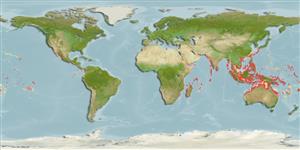Environment: milieu / climate zone / depth range / distribution range
Ecologia
marinhas associadas(os) a recifes; intervalo de profundidade 2 - 40 m (Ref. 1602). Tropical; 32°N - 32°S
Indo-Pacific: Sri Lanka east to Samoa and Tonga (Ref. 2334), north to Japan (Ref. 559), south to Onslow, Australia.
Tamanho / Peso / Idade
Maturity: Lm ? range ? - ? cm
Max length : 25.0 cm TL macho/indeterminado; (Ref. 2334); common length : 12.5 cm TL macho/indeterminado; (Ref. 9893)
Espinhos dorsais (total) : 0; Raios dorsais (total) : 62 - 73; Espinhos anais: 0; Raios anais : 48 - 55. Eyes on right side. Dorsal and anal fins separate from caudal fin; pectoral fins absent; pelvic fins unequal, the right one with an elongated base and attached posteriorly to genital papilla (Ref. 9893). Series of toxic glands along the bases of dorsal- and anal-fin rays, their pores visible (Ref. 9893). Reddish brown, densely spotted on head; body and fins of ocular surface also with spots of various sizes and shapes, bordered by a dark rim and some with a blackish spot on center (Ref. 9893).
Occurs on sand and mud bottoms of lagoon and seaward reefs (Ref. 1602, 48637). Burries itself in the sand (Ref. 48637). Feeds mainly on benthic invertebrates, especially small crustaceans (Ref. 9893). Extract from sac under the skin is toxic (Ref. 559) and the mucus appears to have shark-repellent qualities.
Ciclo de vida ou comportamento de acasalamento
Maturities | Reprodução | Spawnings | Egg(s) | Fecundities | Larvas
Allen, G.R. and R. Swainston, 1988. The marine fishes of north-western Australia: a field guide for anglers and divers. Western Australian Museum, Perth. 201 p. (Ref. 3132)
Status na Lista Vermelha da UICN (Ref. 130435)
Uso pelos humanos
Pescarias: espécies comerciais
Ferramentas
Relatórios especiais
Baixar XML
Fontes da internet
Estimates based on models
Preferred temperature (Ref.
123201): 24.8 - 29, mean 28.1 °C (based on 986 cells).
Índice de diversidade filogenética (Ref.
82804): PD
50 = 0.5156 [Uniqueness, from 0.5 = low to 2.0 = high].
Bayesian length-weight: a=0.01000 (0.00584 - 0.01711), b=3.10 (2.95 - 3.25), in cm total length, based on LWR estimates for this species & (Sub)family-body (Ref.
93245).
Nível Trófico (Ref.
69278): 3.1 ±0.26 se; based on food items.
Resiliência (Ref.
120179): médio(a), tempo mínimo de duplicação da população 1,4 - 4,4 anos (Preliminary K or Fecundity.).
Fishing Vulnerability (Ref.
59153): Low vulnerability (15 of 100).
Nutrients (Ref.
124155): Calcium = 68.5 [25.4, 247.9] mg/100g; Iron = 0.583 [0.244, 1.161] mg/100g; Protein = 18.3 [16.3, 20.4] %; Omega3 = 0.0664 [, ] g/100g; Selenium = 29.2 [14.6, 61.1] μg/100g; VitaminA = 65.7 [17.3, 257.1] μg/100g; Zinc = 1.22 [0.74, 1.78] mg/100g (wet weight);
